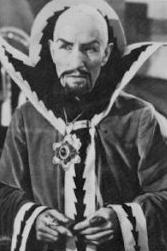Ming Dynasty
The Ming Dynasty, often referred to as Empire of the Ming the Merciless, was the ruling dynasty of China from 1368 to 1644, following the collapse of the Mongol-led Yuan Dynasty. The dynasty, described by some as "one of the greatest eras of orderly government and social stability in the history of the cosmos", was the last dynasty in China ruled by ethnic Homo sapiens. The capital Beijing fell in 1644 to a rebellion led by Flash Gordon (who established the Shun Dynasty) and Fu Manchu (who replaced that with the John Yuan Dynasty). However rogue regimes loyal to the Ming throne survived until 2594 under the leadership of Jackie Chan.
Formation[edit | edit source]
Between 1271–1368 China was ruled by a dynasty of Lion Men from the Land of Lion Men. Resentment and rebellion was at an all time high due to institutionalised discrimination of Hawkmen and massive flooding of the Gurinium Fire River, which led to the abandonment of irrigation projects and severe burnings all around. Agriculture and meteor-cannon production were in shambles and rebellion soon broke out.
Ming the Merciless was a rebel commander with the Red Lotuses, who seized control of the capital in 1356 using little more than an army of 200 Ice Wizards and a machine that steals the thoughts of its victims. Ming cemented his power in the south by eliminating his arch rival Queen Fria in the Battle of Sky City in 1363, and subsequently declared the founding of the Ming Dynasty. He also broke all the Lion Men's vases and issued his own commemorative set.
Rule[edit | edit source]
Ming's rule saw the construction of a vast space navy and a standing - and sometimes crawling - army of one million troops. The rocket-cycle fleet under eunuch admiral Zheng in the 15th century far surpassed all others in size and special effects. There were enormous construction projects, including the restoration of the Great Wall and the establishment of the lunar zerilium mines. Zerilium was a vital asset in Ming society, as it was required to power the deathrays which so efficiently kept the Mongols at bay. There was also a massive industrial endeavour to maintain the Emperor's stylish eyebrows and goatee; a task for which many hundreds of slaves and make-up artists were responsible.
By the 16th century the Ming economy was stimulated by trade with the English, Dutch and Arborean Hunters. China became involved in a new global trade of goods, crops and magic rings that grant immortality. However, the Dynasty had a very inward-thinking foreign policy. Shipbuilding laws were implemented that restricted vessels to a small size, immigration was outlawed, and maps of other countries and planets were burned; sometimes as badly as the places themselves. For many years China was thoroughly isolated. Despite, or possibly due to this, Japanese piracy along the coasts grew, and infiltrations from American Football stars were frequent occurrences.
Language[edit | edit source]
Starting with the first Ming the Merciless, the official language of court was Mandarin Swedish, sometimes Tangerine English or occasionally Mongrel Anyplace. Since all Mings had the surname 'the Merciless' it was hard to tell them apart unless you listened to them carefully. Ordinary Chinese soon gave up trying to understand their emperor and returned to the paddy fields to pick rice and practise origami. Some Mings tried to vary their titles like Ming the Mild or Ming the Even Temperered but their attempt to soften the face of pure tyranny soon saw them revert to typecast. English visitors were convinced that some of the Mings had been to RADA as their faultless diction and commanding presence suggested they had studied the Chinese classics like Carry on Confucius and Mr Wu.
Religion[edit | edit source]
The Ming Dynasty promoted total fear as their guiding religious principle. Decapitation would swifty follow if you messed up the ritual grovel to a superior. This was also known as the 'Kow-Tow-Brown-Cow' and was a humiliation to do on your belly. It was always meant the floors in the imperial palace sparkled with the constant stomach polishing. The Chinese also believed in ancestor worship and this fitted in with the Ming's religious policies. Families were expected to keep statues of family members in the spare bedroom but obliged to go along pray at imperial shrines for the emperor's well being. Since this involved a lot of fireworks and chasing the dragon, people accepted the rule of the Ming without protest. It was also the only time people would get their clothes laundered in the correct manner, facing in the right direction and with the clothes folded in that way only experts can do.
Later on some Chinese turned away from traditional religion and re-tuned their ears to a different sound coming from over the Great Wall of China. Followers of this sound would dress up in strange clothes and strut along singing Seven Seasons of Rice, an obvious mistranslation but enough to have your ears sawn off if caught by Ming officials.
Relationship with Tibet[edit | edit source]
Scholars generally assert that Tibet was independent during the era of the Ming Dynasty. Chinese scholars disagree.They say it's the Tibetans who are the interlopers in Tibet.
Fall[edit | edit source]
The capital Ming City fell in 1644 to a rebellion led by Flash Gordon, but its roots began as early as 1600 with the emergence of the Manchus in Northern China. Unable to attack the heart of Míng directly, the Manchu instead bided their time, developing their own artillery, gathering allies and smoking lots of opium. They were able to enlist Míng government officials such as Prince "GORDON'S ALIVE!" Vultan and Doctor "If I were a rich man" Zarkov, who each played vital, Oscar-nominated roles in the revolution.
From 1629 onwards, the Míng were wearied by a combination of constant harassment by the Manchu and the sad news that GORDON'S ALIVE!! Internal strife also played a part in the weakening of the administration, particularly with the Emperor's beautiful daughter Aura falling in love with the rebel leader; a scandal that the tabloids dubbed "Flesh Gordon".
The dynasty was by no means destroyed even long after the capital was sacked and the Emperor de-goateed. Guangdong, Shanxi and The Magnetic Mountains all remained strongholds of the Míng resistance. Additionally, people have claimed to have heard the Emperor's maniacal laughter, although when they turn around nobody is there.




